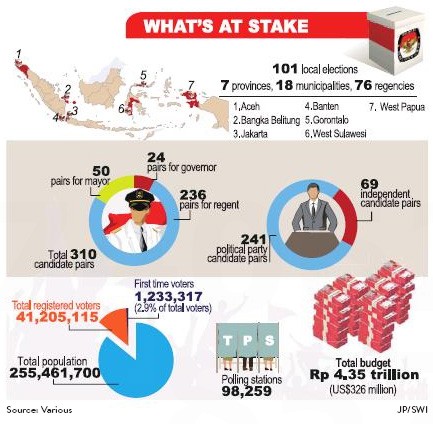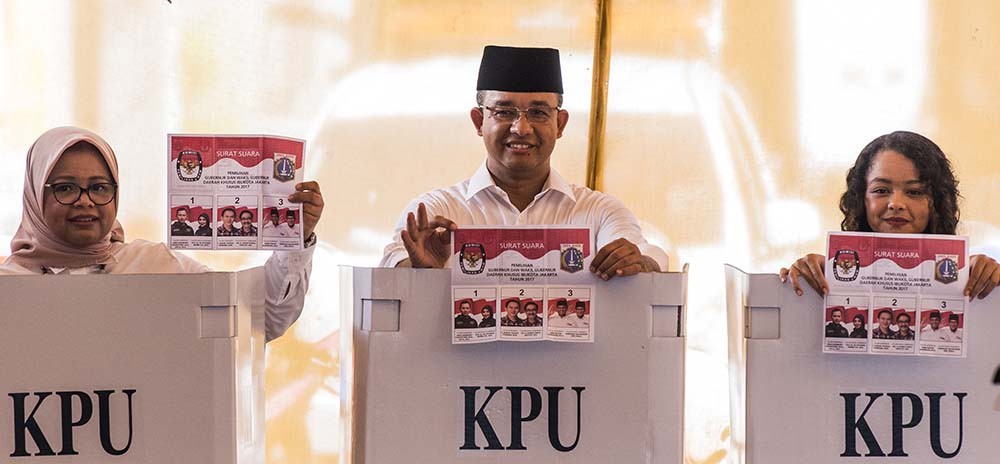Popular Reads
Top Results
Can't find what you're looking for?
View all search resultsPopular Reads
Top Results
Can't find what you're looking for?
View all search resultsElections to define democracy’s new course
Change text size
Gift Premium Articles
to Anyone
M
ore than 41 million Indonesians will get the chance on Wednesday to join the “festival of democracy” in the elections across 101 regions, but all eyes are on the Jakarta election, with much at stake for Indonesian democracy.
Analysts have said the electoral process in Jakarta will not only affect the capital but also the national political process gearing up to the 2019 presidential election, with political elites taking part in the three-horse race.
Candidate pair Agus Harimurti Yudhoyono-Sylviana Murni has former president Susilo Bambang Yudhoyono. Incumbent pair Basuki “Ahok” Tjahaja Purnama-Djarot Saiful Hidayat has ruling Indonesian Democratic Party of Struggle (PDI-P) chairwoman Megawati Soekarnoputri, while Anies Baswedan-Sandiaga Uno has Prabowo Subianto, the archrival of President Jokowi during the 2014 election.
 2017 Regional Elections: What's at stake?(The Jakarta Post/File)
2017 Regional Elections: What's at stake?(The Jakarta Post/File)
Hendri Satrio, political expert from Paramadina University, said what happened in the 2014 presidential election with the rise of President Joko “Jokowi” Widodo from a governor to a president had given people strong reason to believe that the Jakarta election would play an important role on deciding the political climate in the next presidential election.
Hendri said even though the three candidates had promised not to be tempted by the opportunity to run for president, in politics anything could happen.
“Just look at Jokowi, he said he did not want to run in 2014 but the facts show otherwise,” he said.
Whoever wins the Jakarta gubernatorial election will change political play at the national level, but the Jakarta race is more than electoral politics because Ahok, a double minority with his Christian and Chinese-descent background, has opened a Pandora’s box of sectarian sentiment.
A controversial figure with vocal supporters and haters, Ahok inspired two large rallies in which hundreds of thousands of people took to the streets. Led by firebrand clerics such as Rizieq Shihab of the Islam Defenders Front (FPI) and Bachtiar Nasir of the Family of Love Alliance (AILA), the rally participants demanded the prosecution of Ahok.
(Read also: Meet the faceless volunteers of electoral democracy)
Hendri said there was a possibility of uproar and more protests if Ahok retained his position. Conservative groups, he said, could exploit the blasphemy case and anti-Ahok sentiment for their own cause if Ahok won the election.
The Jakarta election has paved the way for public debate on the meaning of diversity, tolerance and democracy in Indonesia, with each camp claiming their own definition and concept.
While public debate online and offline has shown robust discussion, has the hullabaloo meant anything to Indonesian democracy?
A political scientist from the University of Indonesia, Dirga Adiansa, offered his insight about how the electoral process in Jakarta would improve Indonesia’s democracy, or not.
He said the Jakarta election showed democracy was merely treated as a process of electing a leader. “It is only a vehicle for voters to voice their choice of leader, and convince others to choose the same one,” Dirga said Tuesday.
Democracy, he said, should be about mapping common problems, voicing collective needs, aggregating residents’ interests, or a tool in which residents demanded what they should get and should not get from their leaders.
 Jakarta gubernatorial candidate Anies Baswedan (center), his wife Fery Farhati Ganis (left) and daughter Mutiara Annisa Baswedan (right) show the ballots at the Cilandak Barat 28 polling station in Jakarta on Wednesday.(Antara/M Agung Rajasa)
Jakarta gubernatorial candidate Anies Baswedan (center), his wife Fery Farhati Ganis (left) and daughter Mutiara Annisa Baswedan (right) show the ballots at the Cilandak Barat 28 polling station in Jakarta on Wednesday.(Antara/M Agung Rajasa)
The process today, with all the noise coming from voters publicly supporting and campaigning for their own champion, makes citizens forget that they should be critical of their leaders, he said.
“There is nothing substantial [for democracy] in relation to such a process,” said Dirga.
On Wednesday, more than 41.2 million people in seven provinces, 18 municipalities and 76 regencies will vote for their leader for the next five years. The
Rp 4.3 trillion (US$322.5) event will see 310 pairs contesting.
In Jakarta, a number of media outlets have announced they will show quick counts on Wednesday. Among them are The Jakarta Post, Net TV, Liputan 6, Kompas, detik.com and ANTV.










